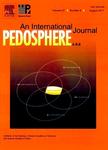Biodegradation of Pentachloronitrobenzene by Labrys portucalensis pcnb-21 Isolated from Polluted Soil
Biodegradation of Pentachloronitrobenzene by Labrys portucalensis pcnb-21 Isolated from Polluted Soil作者机构:Key Laboratory of Microbiological Engineering of Agricultural Environment Ministry of Agriculture College of Life Sciences Nanjing Agricultural University Nanjing 210095 (China)
出 版 物:《Pedosphere》 (土壤圈(英文版))
年 卷 期:2011年第21卷第1期
页 面:31-36页
核心收录:
学科分类:07[理学] 0818[工学-地质资源与地质工程] 09[农学] 0903[农学-农业资源与环境] 0904[农学-植物保护] 0901[农学-作物学] 090401[农学-植物病理学] 090402[农学-农业昆虫与害虫防治] 0713[理学-生态学]
基 金:Supported by the National High Technology Research and Development Program of China (No. 2007AA10Z405) the National Natu-ral Science Foundation of China (No. 31070100) the Key Technology R&D Program of Jiangsu Province,China (No. BE2008669)
主 题:aeration bacterial strain electron acceptors electron donors sterile soil
摘 要:A bacterial strain, pcnb-21, capable of degrading pentaehloronitrobenzene (PCNB) under aerobic and anoxic conditions, was isolated from a long-term PCNB-polluted soil by an enrichment culture technique and identified as Labrys portucalensis based upon its morphological, physiological and biochemical properties, as well as 16S rRNA gene sequence analysis. Effects of different factors, such as temperature and pH, on PCNB biodegradation were studied. Strain pcnb-21 efficiently degraded PCNB at temperatures from 20 to 30 ℃ and initial pH values from 4 to 7, which might be the first time that a Labrys strain was found capable of eflClciently degrading PC1NB. The degradation of PCNB was affected by oxygen, and the degradation decreased with increasing aeration. Exogenous electron donors such as glucose, lactic acid and succinic acid promoted the biodegradation of PCNB, while electron acceptors such as sodium nitrite, sodium sulfate, sodium nitrate and sodium sulfate inhibited PCNB biodegradation. The degradation of PCNB in sterile and non-sterile soils by a green fluorescent protein (GFP)-labeled strain, pcnb-21-gfp, was also studied. Cells of pcnb-21-gfp efficiently degraded 100 mg kg-1 PCNB in sterile and non-sterile soils and could not be detected after 42 days. Strain pcnb-21 might be useful in bioremediating PCNB-polluted soils and environment.



